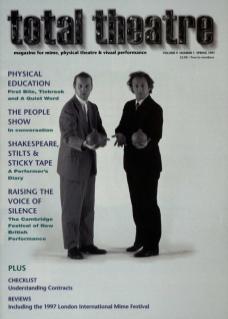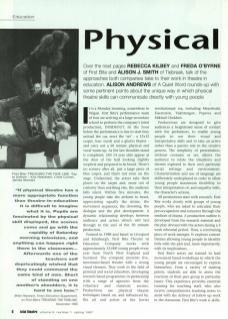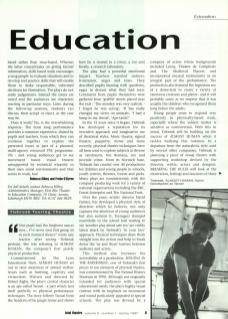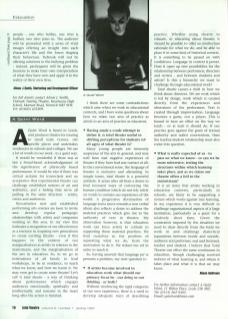It is a Monday morning, somewhere in Wigan. First Bite's performance team of four are arriving at a large secondary school to perform the company's latest production, Insideout. In the hour before the performance is due to start they unload the car, erect the 'set' – a 12x12 carpet, four stools and a ghetto blaster – and carry out a 50 minute physical and vocal warm-up. As the last shoulder-stand is completed, 250 14 year-olds appear at the door of the hall looking slightly sceptical and prepared to be bored. There's no scenery after all, just a large piece of blue carpet, and that's not even on the stage. Undaunted, the actors take their places on the carpet and, more out of curiosity than anything else, the audience falls silent. Within five minutes, the young people take the artform to heart, appreciating equally the mime, the movement sequences, the clowning, the dialogue and the plot development. A dynamic relationship develops between audience and actors which will last through to the end of the 50 minute production.
Formed in 1988 and based in Liverpool and Edinburgh, First Bite Theatre in Education Company works with approximately 35,000 young people every year from North West England and Scotland. The company presents live, movement-based theatre with a strong visual element. They work in the field of personal and social education, developing research-based programmes in partnership with a range of agencies from the voluntary and statutory sectors. Productions use physical theatre techniques based on, and influenced by, the art and artists of the Soviet revolutionary era, including Meyerhold, Eisenstein, Vakhtangov, Popova and Mikhail Chekhov.
Productions are designed to give audiences a heightened sense of contact with the performers, to enable young people to use their visual and interpretative skills and to take an active rather than a passive role in the creative process. The simplicity of presentation, without costume or set, allows the audience to relate the situations and themes explored to their own particular social settings and environment. Characterisation and use of language are deliberately underplayed in order to allow young people maximum flexibility in their interpretation of, and empathy with, the character's actions.
All productions start with research. First Bite works closely with groups of young people, who are asked to articulate their preoccupations and concerns through the medium of drama. A production outline is developed from the research material and the play devised with the actors during a three-week rehearsal period. Thus, a convincing piece of work emerges. It explores current themes allowing young people to identify fully with the plot and, more importantly, with its implications.
First Bite's actors are trained to lead movement based workshops in which the young people are encouraged to express themselves. From a variety of starting points, students are able to assess the reactions of their peer group to particular issues. This experience provides essential training for teaching staff, who also receive comprehensive teaching notes to assist with the delivery of follow up work in the classroom. First Bite's work is skills-based rather than issue-based. Whereas the latter concentrates on giving factual information, skills based work encourages young people to evaluate situations and to develop and practice skills that will enable them to make responsible, informed decisions for themselves. The plays do not make judgements. Instead the issues are raised and the audiences see characters reacting in particular ways. Later, during the follow-up sessions, students can discuss, then accept or reject, as the case may be.
Does it work? Yes, is the overwhelming response. The hour-long performance provides a common experience, shared by pupils and teachers, from which they can continue together to explore the presented issues as part of a planned, multi-agency resourced PSE programme. Oh – and young audiences get to see movement-based visual theatre unsupported by technical wizardry in their own social environments and that seems to work, too!
Rebecca Kilbey and Freda O'Byrne
For full details contact Rebecca Kilbey, Administrative Manager, First Bite Theatre in Education Company, 15 Cluny Avenue, Edinburgh EH10 ARN.
Tiebreak Touring Theatre
‘One pupil had the brightest saucer eyes... I've never seen this group sit in such stunned silence’ wrote one teacher after seeing Tiebreak perform. She was referring to Almost Human, the company's first purely physical production.
Commissioned by The Lynx Educational Trust, Almost Human set out to raise awareness of animal welfare issues such as hunting, captivity and vivisection. Written and directed by Robert Rigby, the play's central character is an ape called Tarzan – a part which lent itself perfectly to physical performance techniques. The story follows Tarzan from the freedom of his jungle home and shows how he is treated in a circus, a zoo and finally, a research laboratory.
The play had a powerful emotional impact. Teachers reported sadness, frustration, anger and tears. They described pupils buzzing with questions, eager to discuss what they had seen. Comments from pupils themselves were gathered from 'graffiti' sheets placed near the exit – 'The monkey was very realistic – I forgot he was acting', 'It has really changed my views on animals', 'I had a lump in my throat', 'Ape-tastic!’
In the fifteen years since it began, Tiebreak has developed a reputation for its inventive approach and imaginative use of theatrical styles. Music theatre, signed theatre, puppetry, mime and, more recently, physical theatre techniques have all been used to explore subjects as diverse as rainforests, the Romans, sex and juvenile crime. From its Norwich base, Tiebreak has created over 40 productions for children and young people in schools, youth centres, theatres, forests and parks. Many plays are commissioned, with the company producing work for a variety of national organisations including the BBC, Forest Enterprise and The National Trust.
Over the years, artistic director David Farmer, has developed a physical style of direction which he believes, not only captures the attention of young audiences but also sustains it. Teenagers slumped resentfully in the school hall waiting to see 'another play about safe sex' are visibly taken aback by Tiebreak's 'in your face' approach. Physical techniques draw them straight into the action and help to break down the 'us and them' barriers between audience and actors.
This method also increases the accessibility of a production. Singing in the Rainforst, one of Tiebreak's first pieces to use elements of physical theatre, was commissioned by The Natural History Museum in 1990. Although not originally intended for audiences with special educational needs, the play's highly visual content with its emphasis on movement and sound particularly appealed to special schools. The play was devised by a company of actors whose backgrounds included Lecoq, Theatre de Complicite and The Medieval Players, and incorporated musical instruments as an integral part of the performance. The production also featured the ingenious use of a dome-tent to create a variety of rainforest creatures and plants – and it will probably come as no surprise that it was usually the children who recognised them long before the adults.
Young people seem to respond very positively to physically-based work, especially where the subject matter is sensitive or controversial. With this in mind, Tiebreak will be building on the success of Almost Human when it tackles bullying this autumn. In a departure from the naturalistic style used by several other companies, Tiebreak is planning a piece of visual theatre with supporting workshop devised by the director, writer, actors and designer. Breaking the Rules will look at the motivation, feelings and reactions of three people – one who bullies, one who is bullied, one who joins in. The audience will be presented with a series of vivid images offering an insight into each character's life and the forces shaping their behaviour. Tiebreak will not be offering solutions to the bullying problem – instead, participants will be given the freedom to make their own interpretation of what they have seen and apply it to the reality of their own lives.
Alison J Smith, Marketing and Development Officer
For full details contact Alison J. Smith, Tiebreak Touring Theatre, Heartsease High School, Marryat Road, Norwich NR7 9DF.
A Quiet Word
It would be wonderful if there was at last a broad-based acknowledgement of the significance of physically based performance. It would be nice if there was critical acclaim for iconoclasts and an acceptance that experimental theatre can challenge established notions of art and aesthetics, and a feeling that we're all pulling in the same direction – artists, critics and audiences.
Nevertheless new and established performing arts courses are keen to invite and develop regular pedagogic relationships with artists and companies working in this area. In my view this indicates a recognition of our effectiveness as a resource in inspiring new generations to create exciting theatre – even if this happens in the context of our marginalisation as artists in relation to the mainstream, and the marginalisation of the arts in education. So, in we go to institutions of all kinds: to lead workshops, to be in residence, to teach what we know, and how we learnt it. We may even get to create some theatre! Let's call it total theatre – a way of thinking about performance which engages audiences emotionally, spiritually and intellectually, and remains in the heart long after the action is finished.
I think there are some contradictions which arise when we work in educational contexts, and I have some questions about how we relate one area of practice as artists to an area of practice as educators.
Having made a crude attempt to define it, is total theatre useful in shifting perceptions for students (of all ages) of what theatre is?
Many young people are intensely suspicious of the arts in general, and may well have had negative experiences of theatre if they have had any contact at all. In the conventional sense, the language of theatre is exclusive and alienating. In simple terms, total theatre is a powerful antidote. It arises after all from a desire to find resonant ways of conveying the human condition which do not rely solely on words to contain our experience of the world. A progressive devaluation of language and a move towards a non verbal idiom also reflects a desire to address the material practices which give rise to the authority of text in theatre. My observation, however, is that education work can force artists to collude in supporting these material practices. We find ourselves in the position of separating what we do, from the motivation to do it. We reduce our art in order to teach it.
So, having asserted that language per se presents a problem, my next question is:
If artists become involved in education work what should our primary focus be – our doing or our thinking – or both?
Without reinforcing the rigid categories of our own experience, there is a need to develop adequate ways of describing practice. Whether using theatre to educate, or educating about theatre, it should be possible to offer an intellectual rationale for what we do, and to place it in some kind of historical context. It is something to be passed on with confidence. Language in context is power. Does it open up new possibilities for the relationship between performers, directors and writers – and between students and artists? Is this a hierarchy we want to challenge through educational work?
Total theatre causes a shift in how we think about directors. We see work which is led by design, work which is created directly from the experiences and obsessions of the performers. Text is created through improvisation. Language becomes a game, not a prison. This is bound to have an effect on the way we teach – or at least it should do. If our practice goes against the grain of textual authority and realist conventions, then the teacher/student relationship must also come into question.
What is really expected of us – to pass on what we know – or can we be more subversive, testing the structures within which learning takes place, just as we claim our theatre offers a foil to the mainstream?
It is an irony that artists working in education contexts, particularly in schools, are likely to be supporting a system which works against true learning. In my experience it is very difficult to challenge organisational aspects of a large institution, particularly as a guest for a relatively short time. Given the constraints imposed by the situation we need to draw directly from the form we work in and challenge dialectical separations between inside and outside, audience and performer, real and fictional, teacher and student. I believe that Total Theatre can effect the same continuum in education, through challenging received notions of what learning is, and where it takes place and what it is that we may know.
Alison Andrews
Quiet Word is based in Leeds, and produces theatre for touring to small-scale venues, site-specific pieces and undertakes residencies in schools and colleges. We use a lot of words in our work – in a quiet way. For further information contact A Quiet Word, 11 Hilton Place, Leeds LS8 4HE. Email: quietword@msn.com



